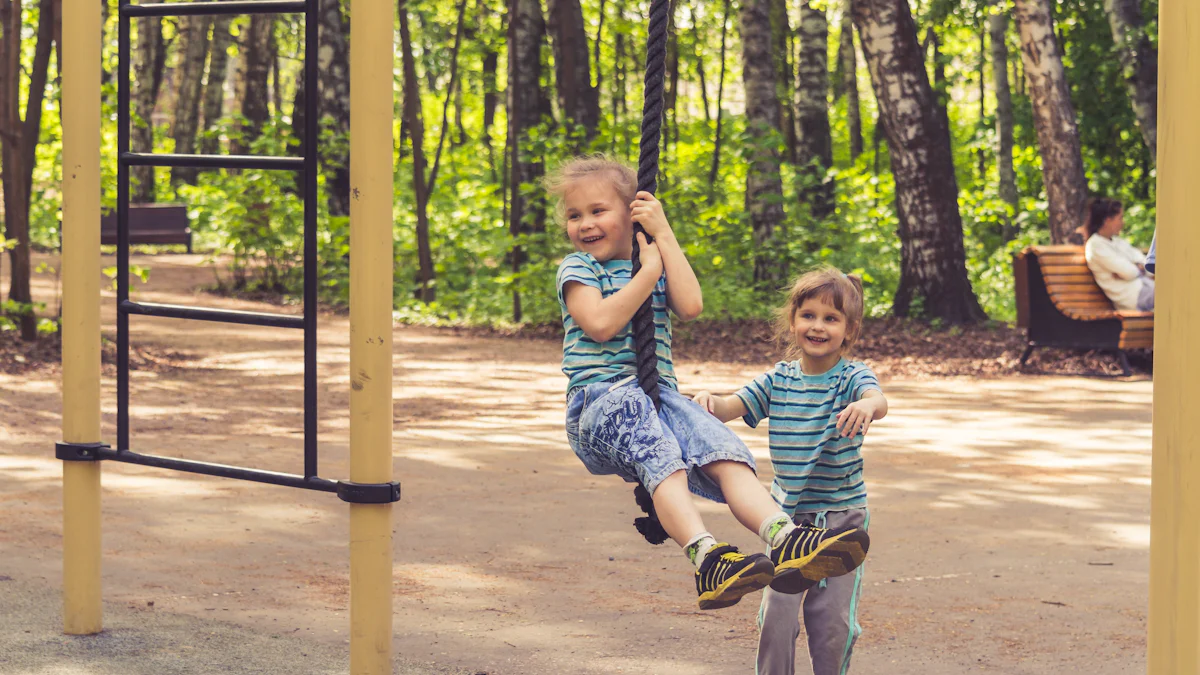Why It's Important to Let Your Kids Make Mistakes

Allowing Your Child to Make Mistakes offers a powerful lesson. Mistakes serve as stepping stones for growth. Children learn resilience and adaptability through these experiences. Let Your Kids Make Mistakes and Learn from them. This approach helps the child make good decisions in the future. Overprotective parenting often hinders this natural learning process. Allowing kids to make minor decisions fosters independence. When children make mistakes, they develop self-confidence. The Grow Preschool Curriculum encourages kids to explore and learn. Homeschooling Boys can benefit from this approach. Books and Homeschool Performing Arts provide valuable lessons.
Building Resilience in Kids

Understanding Resilience
Definition and significance
Resilience represents the ability to bounce back from challenges. This skill plays a crucial role in a child's development. Resilient children face difficulties with courage and determination. They learn to adapt to changing circumstances. This adaptability helps children thrive in various environments. Resilience fosters a positive mindset in children. Children develop confidence through overcoming obstacles.
How mistakes contribute to resilience
Mistakes serve as valuable lessons for children. Each mistake provides an opportunity to learn and grow. Children gain strength by facing and overcoming errors. Mistakes teach children the importance of perseverance. Children learn to view setbacks as stepping stones. This perspective encourages a growth mindset enhances resilience in children. Celebrating mistakes as part of learning supports emotional development. Teachers can embed this philosophy into their teaching methods.
Real-life Examples
Stories of resilient individuals
Many successful individuals have faced numerous setbacks. These individuals used mistakes as learning opportunities. J.K. Rowling faced multiple rejections before publishing Harry Potter. Her perseverance led to worldwide success. Thomas Edison experienced countless failures before inventing the light bulb. Edison's resilience paved the way for groundbreaking innovations. These stories inspire children to embrace mistakes.
Lessons learned from mistakes
Children can draw valuable lessons from these examples. Mistakes teach children the importance of persistence. Children learn that failure is not the end. Each error provides a chance to improve and innovate. Mistakes encourage children to explore new approaches. Creative thinking develops through trial and error. Children learn to assess their actions and make better choices. This process builds resilience and prepares children for future challenges.
Developing Social and Emotional Skills in Kids
Emotional Intelligence
Recognizing and managing emotions
Children need to understand their feelings. Recognizing emotions helps children respond appropriately. This skill builds emotional intelligence. Children learn to identify happiness, sadness, anger, and fear. Managing these emotions becomes easier with practice. Children gain control over reactions. Emotional regulation supports positive behavior. A child's ability to manage emotions enhances well-being. Emotional health fosters better social interactions.
Empathy and understanding others
Empathy allows children to connect with others. Understanding different perspectives strengthens relationships. Children learn to listen and respond with kindness. Empathy encourages cooperation and teamwork. Children develop compassion through shared experiences. Recognizing others' emotions builds trust. Empathetic children create supportive environments. Friendships deepen when children show understanding. Empathy leads to meaningful connections.
Social Interactions
Navigating friendships and conflicts
Friendships play a vital role in a child's life. Children learn to communicate and share. Positive interactions enhance social skills. Conflicts arise naturally in friendships. Children discover ways to resolve disagreements. Problem-solving strengthens bonds. Children grow through these experiences. Navigating social dynamics builds confidence. Friendships teach valuable lessons in cooperation.
Learning from social mistakes
Mistakes occur in social settings. Children sometimes say or do the wrong thing. These moments provide learning opportunities. Children reflect on actions and outcomes. Understanding mistakes leads to personal growth. Children learn to apologize and make amends. Social errors teach resilience and adaptability. Celebrating mistakes as part of learning supports emotional development. Children become more thoughtful and considerate.
Positive emotional and behavioral health enhances a child's sense of well-being, supports social relationships, and facilitates academic potential. Acknowledging mistakes as positive contributes to this development.
Enhancing Decision-Making Abilities in Kids
Critical Thinking
Analyzing situations and consequences
Critical thinking empowers a child to assess situations effectively. A child evaluates different scenarios and predicts outcomes. This skill helps a child understand the impact of actions. Mistakes serve as valuable learning tools in this process. A child learns to recognize patterns and anticipate results. Encouraging a child to analyze situations builds confidence. Confidence grows when a child sees improvement in decision-making.
Logical Reasoning: Mistakes need to be a natural part of the learning process that fosters development.
Making informed choices
Informed choices stem from understanding and reflection. A child gathers information and weighs options carefully. This approach leads to better decision-making skills. Mistakes highlight areas for improvement and growth. A child learns to consider multiple perspectives before acting. This habit nurtures a thoughtful and deliberate mindset. Encouraging a child to make informed choices fosters independence.
Problem-Solving Skills
Approaching challenges creatively
Creative problem-solving involves thinking outside the box. A child explores various solutions to overcome obstacles. Mistakes encourage a child to try new approaches. Each error provides insight into what works and what doesn't. A child learns to adapt strategies and innovate. Creativity flourishes when a child feels free to experiment. Support from adults enhances a child's confidence in creative endeavors.
Perspective shift: Rather than thinking of miscalculations as a signal of a broken brain, consider them as evidence that the brain's shortcuts aren't always useful.
Learning from trial and error
Trial and error offer practical lessons in problem-solving. A child tests ideas and observes outcomes. Mistakes reveal gaps in understanding and spark curiosity. A child gains resilience by persevering through challenges. Each attempt builds a child's knowledge and experience. Encouraging a child to learn from trial and error promotes growth. Growth occurs when a child embraces mistakes as learning opportunities.
Logical Reasoning: Mental processes mentioned above are useful in many areas of everyday life.
Encouraging Independence in Kids

Fostering Self-Reliance
Trusting their own judgment
Encouraging a child to trust their own judgment builds self-reliance. Children gain confidence when they make decisions independently. This process involves allowing a child the freedom to explore options. Mistakes become valuable lessons in decision-making. Children learn to evaluate outcomes and adjust their choices. Trust in their abilities grows with each experience. A child develops a sense of ownership over their actions.
Building confidence through experience
Experience plays a crucial role in building confidence. Allowing a child to make mistakes fosters growth. Each mistake offers a chance to learn and improve. Children develop resilience by overcoming challenges. Confidence emerges as children navigate new situations. Encouragement from parents reinforces this growth. A child feels empowered to tackle future obstacles.
Balancing Guidance and Freedom
Knowing when to step in
Parents must find the right balance between guidance and freedom. Knowing when to step in requires careful observation. Parents should provide support without overshadowing independence. Children need space to make their own choices. Guidance helps when a child faces overwhelming challenges. Parents can offer advice while respecting a child's autonomy. This approach nurtures trust and mutual respect.
Allowing room for growth
Allowing room for growth involves giving a child the freedom to make mistakes. Children thrive when they explore their capabilities. Mistakes become stepping stones for personal development. Parents should celebrate these learning opportunities. Growth occurs as children learn from their experiences. Encouraging a child to embrace challenges fosters independence. A supportive environment enhances a child's ability to adapt and succeed.
As Dr. Jim Taylor suggests, fostering independence involves maintaining a connection. Children depend on parents for values and support. Encouraging independence does not mean detachment. It means guiding children while allowing them the freedom to grow.
Long-term Benefits of Letting Kids Make Mistakes
Preparing for Adulthood
Coping with real-world challenges
Let Your Kids Make Mistakes to prepare them for adulthood. Real-world challenges require resilience and adaptability. Richard Branson, Bill Gates, and Mark Zuckerberg faced failures before achieving success. These experiences teach valuable lessons. Boys grow stronger by learning from setbacks. Mistakes help children develop problem-solving skills. Blue Bells School in Gurgaon encourages this approach. HPA Kids programs support resilience through creative activities. Mistakes build confidence in handling life's uncertainties.
Adapting to change and uncertainty
Adapting to change is crucial for future success. Kids learn flexibility by facing unexpected situations. Mistakes offer opportunities to practice adaptability. CBSE Schools in Gurgaon focus on nurturing this skill. Children gain confidence in navigating new environments. Blue Bells School promotes growth through experiential learning. HPA Kids production fosters creativity and adaptability. Mistakes become stepping stones for personal development.
Lifelong Learning
Embracing a growth mindset
A growth mindset transforms mistakes into learning opportunities. Children see errors as chances to improve. This perspective encourages continuous learning. Blue Bells School in Gurgaon emphasizes this mindset. Students learn to embrace challenges with enthusiasm. HPA Kids programs inspire curiosity and exploration. Mistakes fuel the desire to learn and grow. CBSE Schools cultivate a culture of lifelong learning.
Continual personal development
Continual personal development thrives on learning from mistakes. Kids make decisions and reflect on outcomes. This process fosters self-awareness and growth. CBSE Affiliated Schools in Gurgaon support this journey. Blue Bells School encourages students to pursue passions. HPA Kids programs nurture talents and interests. Mistakes guide children toward self-improvement. Personal growth becomes a lifelong pursuit.
Schools in Gurgaon recognize the benefits of allowing kids to make mistakes. Mistakes provide valuable lessons in resilience, adaptability, and growth. Blue Bells School and other CBSE Schools foster environments where children thrive. Encouraging kids to learn from mistakes prepares them for a successful future.
Letting kids make mistakes plays a vital role in their growth. Mistakes help children develop resilience and adaptability. Boys and girls learn to view errors as opportunities. This approach builds confidence and emotional strength. Encouraging children to embrace mistakes fosters independence. Parents and educators should celebrate these learning moments. A supportive environment helps kids thrive. Emphasize the importance of mistakes in child development. Allowing kids to learn from errors prepares them for future success.
See Also
Guiding Kids to Embrace Their Mistakes Gracefully
Instilling Patience in Your Children
Building Trust with Kids to Encourage Open Communication

